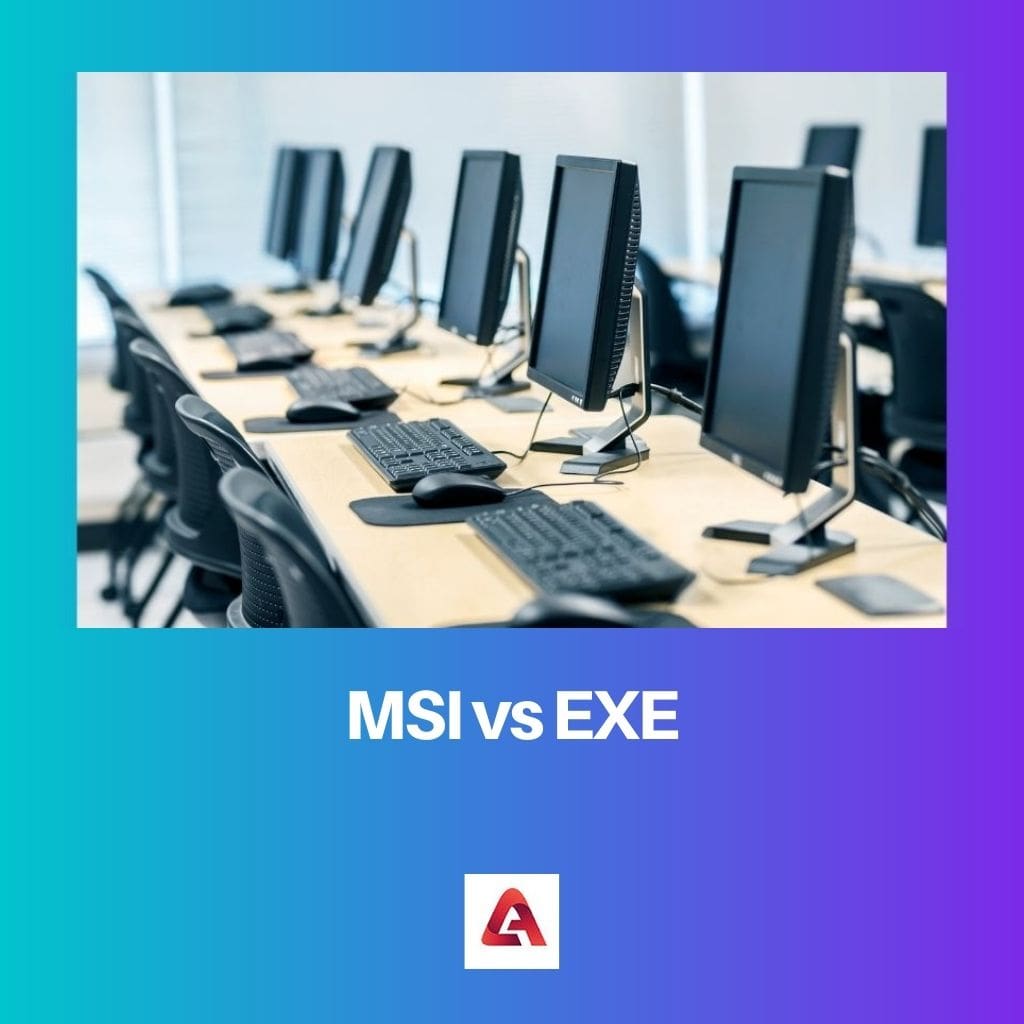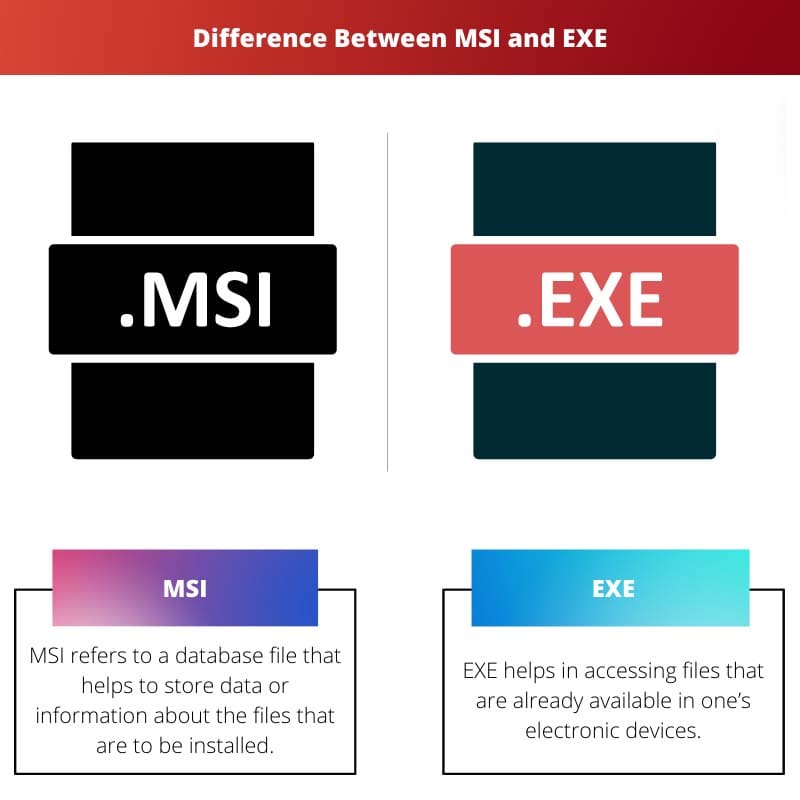Computers come with many pre-installed applications and software, but it is undeniably unusual for a computer not to install new software tools.
As a result, installing additional software on your Windows device may include acquiring an installer by downloading the free ones or purchasing one off the web.
Installers come in two unique files that need to open to commence the installation.
One file has an MSI extension, and the other has an EXE extension.
Computer users around the globe encounter these common extensions from time to time while updating or installing PC stuff or other systemic changes and confuse .msi and .exe with being the same thing, for both these files execute the same function of installing a software program on your computer. However, both of them have different methods of doing so.
Key Takeaways
- MSI (Microsoft Installer) files are installation packages for Windows applications, using a standard format for managing installation and removal processes.
- EXE (executable) files are program files containing instructions a computer can execute, including application installers and standalone applications.
- Both file types can be used for software installation, but MSI files offer more consistent and manageable installation experiences, while EXE files provide greater flexibility for developers.
MSI vs. EXE
MSI means “Microsoft Installer” and is a software component used in Windows systems for the installation, maintenance, and removal of software applications. .EXE is a file extension used in Windows to indicate an executable file. It contains a program or application that can be run or executed.

Comparison Table
| Parameter of comparison | MSI | EXE |
|---|---|---|
| Meaning | MSI refers to a database file that helps store data or information about the files to be installed. | EXE helps access files already available on one’s electronic devices. |
| Basic use | MSI is used for software development. | EXE can be used for almost anything and is not just restricted to software developments. |
| Interfaces | MSI files are considered to have a standard and predefined UI and are easy to work with. | EXE files have different interfaces depending on the hardware or application type. |
| Accompany on installation | The MSI file is said to accompany an on-demand installation feature so that the remaining part can be done after the software is launched. | The EXE file does not have this feature since it has to have access to all database files. |
| The choice of languages | MSI files do not provide the user’s choice of language for installation, even though this feature is incorporated into the MSI software. | An EXE file helps the users to choose a language for installation. |
What is MSI?
MSI stands for Microsoft Silent Installer.
MSI are database files that are the most commonly recommended installation type by Windows Installers. They are considered to be easy to manage and create.
MSI files contain data about an application characterized by components and features.
These features and components consist of shortcuts, files, etc.
MSI is additionally said to have information about the data interface and contain the actual data/files that need to be installed.
The most important part of the MSI files is that they are executed with the help of MSIEXEC.EXE.
MSI files are said to be the future of application packaging, and Microsoft suggests software developers convert the EXE file to MSI files.
MSI files that are created using different tools have a similar management system.
MSI installers are said to have a predefined interface and are mostly considered helpful to new individuals or have limited knowledge of the matter.
All MSI files have the same look and appearance.
One of the best aspects of MSI files is application installations.
MSI helps the application to be set up real quickly.
When MSI helps in installation, only minor stuff is put in the computer, and the installation commences only when the user attempts to run the program.

What is EXE?
EXE stands for the executable file format.
EXE acts like an installer and mainly looks for the files on installation either on the web or the computer.
Windows Installers are considered new in the computing world, and hence MSI files come with an EXE installer similar to a setup.exe.
An EXE does not have a database of files.
EXE files mainly look for an MSI file so that it can install the program. EXE was considered to be the original installer during the earlier times.
An application needs to have at least one EXE file to begin the application. An EXE file gives the user freedom with how the installer interacts.
This can be seen in the latest generation games, which use EXE as installers. Hence, EXE files are GUI flexible.
EXE files have a lot of malicious software, which can, in turn, be harmful.
EXE is also an interactive interface that keeps the user busy until the installation is complete.
EXE files are considered bootstrappers as they set everything in a sequence and do not form an installation.
The EXE file types are said to accommodate easily, while it is hard for MSI installers to perform such challenging tasks.
EXE is also not just concerned with the installation of software.

Main Differences Between MSI and EXE
- MSI stands for Microsoft Silent Installer and is a database file designed explicitly for Microsoft installers. EXE stands for executable file format and helps to receive or open files in the user’s device or would have discovered the need to download them from sources.
- The most crucial use of MSI files is that it helps in software development or installation. The most important benefit of the EXE file is not just limited to software development, for they can practically do anything.
- MSI files are said to have a predefined UI that is simple for the users to work with, and they can be used even by individuals with no technical knowledge. EXE files do not have a definite interface, but they have many interfaces depending on the software.
- An MSI file comes with an installation component to do the installation when the software is launched. An EXE file is not said to have this feature on installation since the EXE file does not have any access to the database on your PC or web.
- Even though the language feature is incorporated into the MSI file, they do not provide the user’s choice of language. The choice of languages on installation in the EXE file helps the users to perform the task less complexly.


I find it ironic that EXE files are considered the original installer, yet there’s a push to convert them to MSI files for better application packaging. It’s an interesting shift in the software development landscape.
The distinction between MSI and EXE files and their respective benefits is crucial for anyone involved in software development. This article provides a comprehensive overview of these file types.
I disagree with the assertion that MSI files provide more consistent and manageable installation experiences. EXE files also have their advantages and offer developers greater flexibility.
The detailed comparison between MSI and EXE files is really informative. It’s important to know the implications of using each type of file for software installations.
The detailed description of MSI and EXE files is extremely useful. This article provides valuable insights into the technical aspects of application installation.
Installing new software is essential for the functionality of your computer. It’s important to understand the differences between MSI and EXE files to make an informed decision.
The information about the future of application packaging and the recommendation to convert EXE files to MSI files is thought-provoking. There are definitely benefits to using MSI installers.
This comparison of MSI and EXE files is very well-researched and presented. It’s refreshing to see such detailed information on this topic.
It’s interesting to see the differences between MSI and EXE files. Many people may not realize the distinction and the impact it has on installation experiences.
The flexibility of EXE files and the standardization of MSI files present interesting dynamics in software installation. It’s a complex but fascinating aspect of computing.